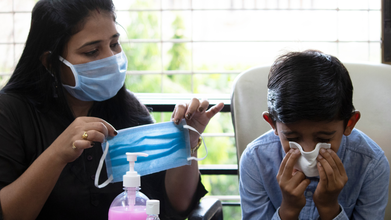- Health Conditions A-Z
- Health & Wellness
- Nutrition
- Fitness
- Health News
- Ayurveda
- Videos
- Medicine A-Z
- Parenting
How Does A Dysfunctional Household Affect Children Later In Life?

How Does A Dysfunctional Household Affect Children Later In Life?
A dysfunctional home is one that revolves around instability - typically because of chemical dependency, mental illness, or a parent's abusing tendencies. The survival techniques for these households replace nurturing to rigid rules and roles that facilitate the dysfunction. Children in unhealthy statuses are doomed to cycles of trauma that affect all individuals within the household. Essentially, a dysfunctional home is synonymous with repeated adverse experiences that leave emotional and psychological scars deep within those involved.
A dysfunctional family is defined by repetitive trauma that affects its members. This trauma is often referred to as Adverse Childhood Experiences (ACEs), which includes physical, sexual, or emotional abuse; neglect; exposure to domestic violence; or living with a caregiver battling addiction, mental illness, or incarceration. Parental separation or divorce also contributes to this dysfunction. These experiences destroy the sense of safety and stability that children need to grow, thus embedding long-term consequences in their development.
How Dysfunctional Families Function
A child needs secure, attuned caregivers. Dysfunctional caregivers do not afford that kind of stability in these homes. However, what's really different are the functional families as against those dysfunctional ones: households that rigidly have dynamics working rather than child-centered well being.
Dysfunctional Parents
Children grow without predictable patterns as their caregiver subjects them to varying behaviors in attempts to induce in them anxious confusion.
Sibling Rivalry
Dysfunctional parenting creates unhealthy competition for attention or affection, breeding resentment between siblings.
Favoritism
Playing favorites fractures sibling relationships, and children are given vastly different upbringings under the same roof.
Long-Term Effects of a Dysfunctional Childhood
The effects of a dysfunctional upbringing spill into adulthood, affecting mental, emotional, and physical health:
- Addiction: The individuals who have been exposed to substance abuse in their families have more possibilities of developing alcohol, drugs, or nicotine dependencies.
- Mental Health Issues: Such trauma during childhood leads to greater occurrences of anxiety, depression, and low self-esteem.
- Relationship Challenges: Emotional neglect or abuse experienced in the early years often leads to difficulties in forming healthy, trusting relationships.
- Health Risks: ACEs and chronic stress can contribute to an increased risk for diseases like cardiovascular disease and diabetes as well as other health risks.
How Dysfunctional Parenting Shapes the Household
The roles and dynamics in a dysfunctional family often continue the problem:
Parental Roles
Dysfunctional parents are frequently overly controlling, neglectful or punitive.
Children's Roles
Children often take on a compensatory role protector, mediator, or scapegoat and have distorted family relationships.
Lack of Boundaries
Dysfunctional families often lack clear boundaries, making it difficult for members to establish individuality and autonomy.
Can a Dysfunctional Family Be Fixed?
Healing a dysfunctional family is possible, but requires on-purpose effort from each person. A big part of breaking the dysfunctional pattern is shattering the rigid roles that have led to the dysfunctional pattern. Once one person begins changing and setting boundaries, getting into therapy, or refusing to go down the destructive road, so can others.
Healing
Share your feelings and experiences
Acknowledging and discussing your experiences can help break the cycle of shame and isolation. Talking to a trusted person or therapist creates a safe space to process emotions and find solutions. Open dialogue fosters connection and helps shift the family dynamic toward healthier interactions.
Build Trust and Establish Boundaries
Learning to trust yourself and others is crucial when healing. Trust takes a lot of time and discernment, especially for those who experienced repeated betrayals. Alongside trust, setting boundaries ensures that relationships are respectful and one's emotional needs are met without comprising one's well-being.
Accept Your Emotions
Children raised in dysfunctional households often suppress emotions as a survival mechanism. Reconnecting with your feelings is a crucial step in the healing process. Allow yourself to experience all emotions—whether joy, sadness, or anger—without judgment.
By validating your feelings, you reclaim your emotional autonomy and begin to heal the wounds of the past. Healing from a dysfunctional childhood is a journey that needs courage and patience. The cycle of trauma can be broken by therapy, support groups, and self-awareness. Scars of a dysfunctional family may never fully go away, but they do not have to be your future. By beginning to take care of yourself, you can create a stable life filled with love and connection.
Dysfunctional parenting leaves deep imprints in individuals and families. Understanding its root causes, acknowledging its impact, and moving toward healing can help break the cycle. It could be through therapy, open communication, or self-reflection-possible to heal.
Baby Born From Liver? Pregnant Woman In Peru Delivers A Child Through Ectopic Pregnancy

Credits: Canva
A 16-year-old mother in Peru delivered a baby who was in placenta that attached to her liver.
This is a rare milestone as the baby has been safely delivering from an abdominal ectopic pregnancy in which the placenta was attached to the mother’s liver.
The case involved 19 year old Valeria Vela, whose pregnancy continued to 40 weeks and resulted in the birth of a healthy baby girl. Health authorities in Peru say this is the first documented case of its kind in the country and only the fourth reported worldwide in which both mother and baby survived.
Understanding the Rarity of Ectopic Pregnancies
Ectopic pregnancies occur when a fertilized egg implants outside the uterus. In most situations, they develop in the fallopian tubes.
Around 96 percent of ectopic pregnancies happen there and only a very small number occur in the abdominal cavity. These pregnancies cannot safely continue because the organs where the egg may attach are not designed to support a growing fetus. In this case, the egg implanted directly on the liver, which meant the fetus relied on the liver’s arteries for blood supply. This created a situation that demanded extremely careful monitoring, as even small shifts in blood flow could have been dangerous.
The Challenges Doctors Faced
For doctors, the biggest challenge was the placenta. Removing a placenta that has attached itself to the liver can cause severe bleeding that can quickly turn fatal. Peru’s Health Minister Luis Quiroz Avilés explained that any attempt to detach it without preparation could have caused life threatening hemorrhage in the mother.
To manage this, the medical team used a technique that closes the arteries feeding the placenta by blocking their blood flow. This approach helped prevent massive bleeding during surgery and gave both mother and baby a chance at survival.
Another extraordinary aspect of this case was that the pregnancy reached 40 full weeks. Previous live abdominal ectopic pregnancies that resulted in birth reached only up to 36 weeks. Doctors followed Valeria closely through her pregnancy and relied on advanced imaging and interventional radiology techniques to keep the situation stable. According to local reports, the clinical management required constant coordination among specialists from obstetrics, radiology, surgery and intensive care.
A Baby Born Against All Odds
The baby, named Aylin, was born on November 30 and weighed 7.9 pounds. Officials revealed the case only after both mother and child were safely discharged from the hospital. Valeria is now in stable condition and recovering well, while Aylin is reported to be healthy.
Why This Does Not Change Standard Care
Although the case has been described as a medical milestone, specialists emphasize that such pregnancies are exceptionally rare. Most ectopic pregnancies cannot continue and trying to carry them comes with severe risks that include hemorrhage, organ damage and even death. For this reason, early diagnosis and timely intervention remain the safest and most widely recommended approach. This case highlights what is medically possible under very specific circumstances, but it does not change established guidelines for managing ectopic pregnancies.
Is There A Link Between Social Media Use And Increased ADHD-Like Symptoms In Kids?

Credits: Canva
Do you feel like your attention span has gone down? Thanks to multiple social media platforms and its shorter duration content, we find ourselves losing attention and cannot keep up with anything that goes a little bit over a minute. This has not just affected us, but children are now being diagnosed with attention deficit hyperactivity disorder (ADHD) more.
A latest peer-reviewed study by Karolinska Institutet, which monitored more than 8,300 US-based children from age of 10 to 14 noted that social media use has lead to increased inattention symptoms.
The researchers of the aforementioned institute in Sweden, along with the Oregon Health & Science University in the US found that children spent an average of 2.3 hours a day watching television or online videos, 1.4 hours on social media and 1.5 hours playing video games.
The study found no connection between ADHD-related behaviors, such as distractibility, and activities like playing video games or watching TV and YouTube. However, long-term social media use was linked to rising inattention symptoms in children. ADHD is a neurodevelopmental condition marked by impulsiveness, trouble focusing and frequently forgetting everyday tasks.
. According to the researchers, “We identified an association between social media use and increased inattention symptoms, interpreted here as a likely causal effect.” They noted that while the impact on each child may be small, widespread behavioral shifts could have a meaningful effect at the population level. The study also suggested that growing social media use may be contributing to the rise in ADHD diagnoses.
Why Social Media May Disrupt Focus
Torkel Klingberg, a professor of cognitive neuroscience at the Karolinska Institute, said the findings pointed specifically to social media as a factor affecting children’s ability to concentrate. He explained that platforms bombard users with constant notifications and messages, and even the anticipation of receiving one can interrupt mental focus. “This affects the ability to stay focused and could explain the association,” he said.
The research also showed that socioeconomic background and genetic risk for ADHD did not change the observed link, suggesting that the distraction-rich environment of social media itself may be responsible. Klingberg added that increasing social media use could partly explain the rise in ADHD diagnoses among children, which grew from 9.5 percent in 2003–07 to 11.3 percent in 2020–22, based on data from the U.S. National Survey of Children’s Health.
Early Social Media Exposure Raises Concerns
The authors stressed that the study does not imply all children who use social media will develop concentration problems. However, they pointed out that many children begin using these platforms well before age 13, the minimum age for apps such as Instagram and TikTok. The report called for stronger age verification measures and clearer guidance from tech companies.
How Much Time Children Spend Online
The study tracked a gradual rise in social media use, from around 30 minutes a day at age nine to about two and a half hours by age 13. The children were enrolled at ages nine and ten between 2016 and 2018. The full findings will appear in the journal Pediatrics Open Science.
Samson Nivins, a postdoctoral researcher at the Karolinska Institute and one of the study’s authors, said the team hopes the results will help parents and policymakers make more informed decisions about healthy digital habits that support children’s cognitive development.
Why A Persistent Cough In Children Needs Attention, And Ways To Strengthen Their Immunity, According To Doctor

Credits: iStock
As winter settles in and children move between school, outdoor play, and indoor gatherings, coughs and colds often become unavoidable companions. While many coughs resolve on their own, doctors warn that a cough that lingers for weeks is not something parents should overlook. At the same time, the cold season naturally weakens a child’s defenses, making it important for families to follow simple steps to improve immunity.
When a Cough Lasts Too Long
According to Dr Nishant Bansal, Consultant Pediatrician and Neonatologist at Motherhood Hospitals, Noida, parents must stay alert when a cough stretches beyond the usual duration. He explains, “A cough that lasts for weeks should never be ignored. While many are caused by mild infections, persistent or recurring coughs can point to allergies, asthma, or an underlying health issue.”
Many children are catching respiratory infections during weather changes or after starting school. As temperatures drop, coughs tend to worsen. What may look like a harmless lingering cold could actually be linked to an allergy, asthma, sinusitis, whooping cough, or even exposure to pollutants and smoke.
Dr Bansal adds, “If a child’s cough becomes worse at night, during exercise, or after exposure to dust or pets, it may be triggered by asthma or allergies. These symptoms should be reported to a doctor without delay.” Children exposed to polluted air or cigarette smoke are especially prone to constant coughing and wheezing.
Ignoring these symptoms can interfere with sleep, appetite, growth, and energy levels. Some infections, such as whooping cough or sinusitis, require prompt treatment to prevent complications. That is why early identification of the cause is essential.
Managing and Preventing Persistent Coughs
Parents often try repeated home remedies such as honey, steam, or warm fluids, but these may not be enough. “If the cough lasts more than two to three weeks, it should be evaluated instead of being managed with only home remedies,” says Dr Bansal.
Indoor air quality plays a major role. Avoid smoking around children, improve ventilation, and use an air purifier if possible. Keeping children well hydrated with warm soups, milk, or water can soothe the throat and loosen mucus. Over the counter cough syrups should be avoided unless a doctor prescribes them.
Warning signs such as wheezing, breathing difficulty, coughing fits, or fever need immediate medical care. Timely guidance helps the child breathe better, recover faster, and avoid long term complications.
Why Winter Increases Illnesses in Children
Children are naturally more vulnerable during colder months. They often face sore throats, colds, coughs, and viral infections that spread easily when people gather indoors. Dr Atul Palwe, Consultant Pediatrician and Neonatologist at Motherhood Hospital, Lullanagar, Pune, explains, “Viruses spread more easily in winter, especially when children stay in closed spaces for long hours.”
Strengthening immunity is key to helping children stay healthy throughout the season.
Simple Ways to Boost a Child’s Immunity
Focus on a Nutritious Diet
“A strong immune system begins with a balanced diet,” says Dr Palwe. He recommends plenty of fruits, vegetables, whole grains, legumes, nuts, and seeds. Foods rich in vitamin C such as oranges, guavas, and amla, along with zinc and iron rich foods, help build resistance.
Maintain Hydration
Children tend to drink less water in winter, but staying hydrated helps the body remove toxins. Warm soups and milk are comforting alternatives.
Encourage Regular Activity
Indoor games, yoga, and outdoor play on pleasant days improve blood circulation and strengthen immunity.
Ensure Adequate Sleep
“Children under ten need about ten to twelve hours of sleep every night to keep their immunity strong,” says Dr Palwe.
Teach Hygiene Habits
Handwashing before meals, after play, and covering the mouth while coughing reduces the spread of infections.
Dress Them Warmly
Layering helps protect children from cold winds while still allowing movement.
Get Enough Vitamin D
Limited sunlight in winter can affect vitamin D levels. Dr Palwe suggests encouraging morning outdoor play or discussing supplements with a doctor if needed.
© 2024 Bennett, Coleman & Company Limited

